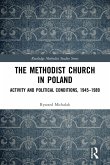What role does religion play in migration processes? What is the reason behind migration of religious minorities? Is religious affiliation a deciding factor in choosing emigration? Some of these questions have been the focus of The Untold Journey of the Nazarene Emigration from Yugoslavia to North America. As the field of migration history is very broad both chronologically and geographically, Aleksandra Djuric Milovanovic focuses on the migration of religious minorities triggered by state repression and the socio-historical context of post-Second World War Yugoslavia. The history and development of the Nazarene communities is analyzed through the lens of religiously motivated persecution and migration from Yugoslavia to North America. The Nazarenes, known as Apostolical Christian Church (Nazarene) in North America, represents a fascinating case study which bring new insights into policies towards minority religions during the communist era, migration patterns, and integration mechanisms in the host country. This book is applicable to contemporary forced migration contexts and to the role of religious communities in supporting the integration of refugees and migrants across the world. The reasons for fleeing, migration paths, and routes, life in the refugee camps and settling into the new society are present in the narratives of present-day refugees and migrants fleeing from conflict or religious intolerance across the globe.
Bitte wählen Sie Ihr Anliegen aus.
Rechnungen
Retourenschein anfordern
Bestellstatus
Storno









